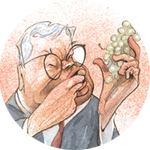 |
|
| Everybody's a critic
Roger Ebert, X’70 In 1975 Roger Ebert became the first person to win a Pulitzer Prize for film criticism. That same year the Chicago Sun-Times columnist and his Chicago Tribune rival Gene Siskel paired for a local PBS show, Opening Soon at a Theater Near You. By 1978 Opening Soon had morphed into the nationally syndicated PBS program Sneak Previews and then into Siskel & Ebert at the Movies, and Ebert found himself with one of the film world’s two most powerful thumbs. Education. After the University of Illinois at Urbana-Champaign, where he was the 1963–64 editor of the Daily Illini (reviewing La Dolce Vita and The Parent Trap), Ebert did graduate work at Illinois, the University of Cape Town, and Chicago. Venues. With the Sun-Times since 1967, Ebert is everywhere, including the University’s Graham School of General Studies, where he teaches a fall quarter, noncredit course (in 2003: “Not the New Wave: Before and after the Revolution”) that over the past quarter century has achieved cult status, with students returning year after year. Following Siskel’s 1999 death, Ebert continued the television show, and in summer 2000 Sun-Times colleague Richard Roeper joined him as cohost on Ebert & Roeper and the Movies. The annual EbertFest—Ebert’s Overlooked Film Festival—began in 1999 in his hometown of Urbana. The four-day event, which includes a series of academic panels at the University of Illinois, showcases a baker’s dozen of films that Ebert thinks deserve another look. This April’s schedule includes a film and panel discussion marking the 50th anniversary of Brown v. Board of Education. Critical choices. He’s against best-of lists. “Lists are a device by editors to give the appearance of a story without the fact of one,” he said in a 2001 CriticDoctor.com interview. But his The Great Movies (2002) does contain essays on 100 classic films—from Aguirre, the Wrath of God to Written on the Wind. Guiding lights. “Movies are an empathy machine. Better than any other art form,” he told RottenTomatoes.com, “they allow us the sensation of standing in somebody else’s shoes. We are trapped in ourselves, in our own box of space and time, and to identify with movie characters is a way to get outside of that box.” The “perfect” review, he said, should “allow a reader to determine whether he or she is likely to enjoy or appreciate a film—but that does not require the critic to agree with the reader. The critic who tries to reflect public taste casts himself in the role of the ventriloquist’s dummy….” How to watch a film, advice dispensed in a May 2000 Sun-Times column: “If you’re really serious about the movies, get together with two or three friends who care as much as you do. Watch the film all the way through on video. Then start again at the top. Whenever anyone sees anything they want to comment on, freeze the frame. Talk about what you’re looking at. The story, the performances, the sets, the locations. The camera movement, the lighting, the composition, the special effects. The color, the shadows, the sound, the music. The themes, the tone, the mood, the style. “There are no right answers,” he continues. “The questions are the point.” On the other side of the screen. The critic has a past as a screenwriter, sometimes under the noms de plume “R. Hyde” and “Reinhold Timme.” His most famous opus is director Russ Meyer’s 1970 cult favorite, Beyond the Valley of the Dolls. Short list. Annual guides to movies, videos, and DVDs; A Kiss is Still a Kiss (Andrews McMeel Publishing, 1984), a collection of interviews; Two Weeks in the Midday Sun (Andrews McMeel Publishing, 1987), chronicling the Cannes Film Festival; The Little Book of Hollywood Clichés: A Compendium of Movie Clichés, Stereotypes, Obligatory Scenes, Hackneyed Formulas, Shopworn Conventions and Outdated Archetypes (Virgin Books, 1995); The Great Movies (Broadway, 2002).
|
|
phone: 773/702-2163 | fax: 773/702-8836 | uchicago-magazine@uchicago.edu

